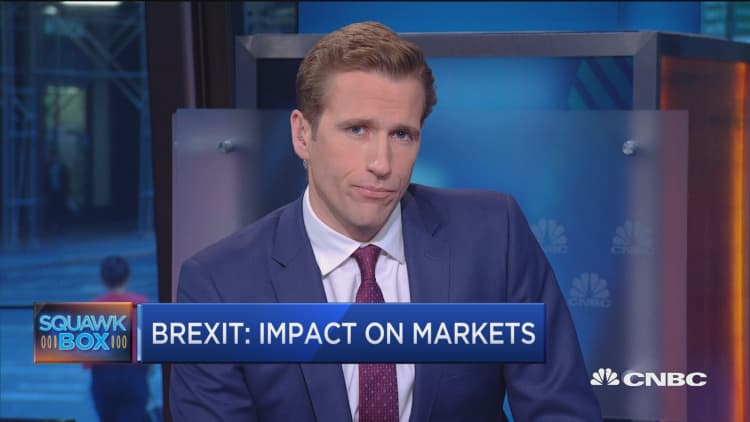The Fed begins its two-day meeting Tuesday as worries about a Brexit seep deeper into market psyche.
Fed watchers do not expect any action from the Federal Open Market Committee, but the central bank could tweak its view on the economy or make changes to its interest rate forecast, when it releases its statement and economic forecasts Wednesday afternoon.
U.S. economic reports Tuesday include the important May retail sales report, expected to to show sales up 0.3 percent, and import prices, both at 8:30 a.m. EDT. Business inventories are released at 10 a.m. and NFIB small business sentiment is out at 6 a.m.
Less than two weeks ago, Fed watchers had seen a chance for a rate hike at this meeting, but the 38,000 nonfarm payrolls in the May jobs report were about 100,000 below some of the lowest forecasts.
"If it hadn't been for the employment report, there was a decent chance they could've gone this week," says Goldman Sachs' chief U.S. economist Jan Hatzius, speaking on "Closing Bell." "Now the question is what do they signal about what happens after the June meeting for July, September."
He says there is a chance the Fed could still hike in the next couple of months, but some Fed watchers say Fed Chair Janet Yellen will provide a time frame and will likely leave the options open.
"We have a 35 percent chance on July and the same on September," Hatzius explains. "So I think there's a decent chance the Brexit vote is a factor, but I think what the most important factor is whether the next employment report shows the last one to be an outlier on the low side."
Meanwhile, markets have been sizing up the pending June 23 U.K. vote on whether to leave the European Union. Fed officials have warned that volatility around the Brexit vote could impact their rate hiking decision, so odds had not been high for a June hike, even before the employment report.
The Brexit has been weighing on European stock markets, and is now rattling the U.S. stock market. The lost 17 points to 2,079 Monday. The CBOE Volatility Index, or VIX has shot up to 20.97, a jump of more than 50 percent in five trading sessions, implying expectations for big swings in the stock market.

Bond yields have also been moving lower on central bank easing but also due in part to concerns about the U.K. vote. The German 10-year bund was yielding barely above zero Monday afternoon, and the U.S. 10-year yield touched a low of 1.60 percent Monday. The impact in currency crosses has been particularly dramatic.
New polls giving Brexit a slight lead and The Sun newspaper's endorsement of Brexit Monday night could fuel more volatility. The Sun'sendorsement could be influential. The newspaper famously claimed to have changed the outcome of the 1992 general election by turning against Labour and Neil Kinnock at the last minute, and backing Conservative John Major, who went on to become prime minister.
"If Britain actually votes for Brexit, it opens up the Pandora's box. It creates a road map for every other country to leave the European Union," says Boris Schlossberg, head of foreign exchange strategy at BK Asset Management.
The pound has been the most actively traded instrument, particularly against the yen. "That's the single biggest volatility trade in this whole trade," Schlossberg says.
Sterling is down 1.5 percent against the dollar in the past week. The euro has also been selling off against the Swiss franc, and investors large and small have been piling into gold.




While it's clear investors are positioning for possible negative news, some strategists do not see a big impact on the U.S. stock market after an initial jolt if the U.K. votes to leave.
"I think it's going to cause a lot of volatility around the U.K. and a lot in Europe but I don't see the longer term effects," said Scott Wren, equity strategist at Wells Fargo Investment Institute. "If we get some downside here from it in stocks, I think it's a buying opportunity."
Others, however, say the markets are not even close to pricing in their worst fears, but there's certainly talk about it.
"It's an unknown and people fear the worst because it's such a fragile situation," says Marc Chandler, chief currency strategist at Brown Brothers Harriman. He said traders have been positioning more actively, with volatility rising in sterling and impacts being felt across peripheral European sovereign debt.
"Most of the polls are so close that it is within a margin of error. So the prudent thing to do is to hedge. It's the same reason you have fire insurance on your house. You can't afford the risk of ruin," Chandler adds.


